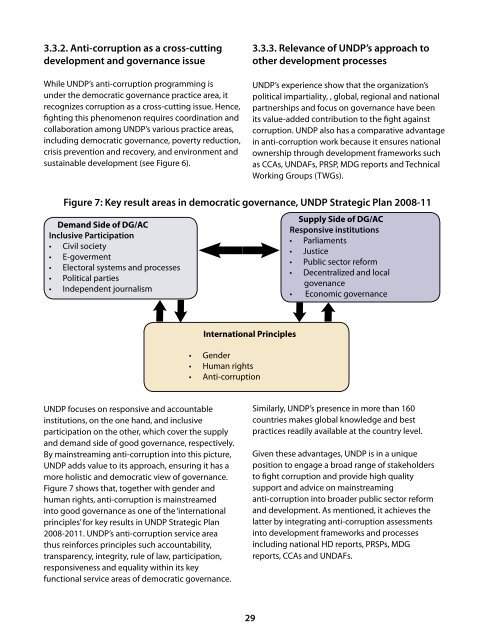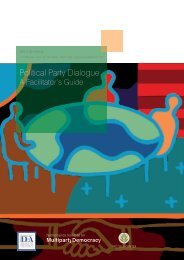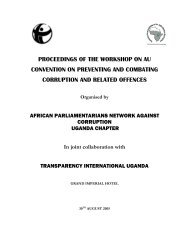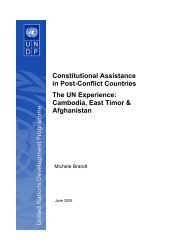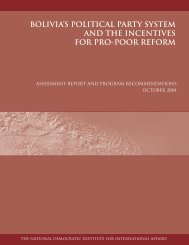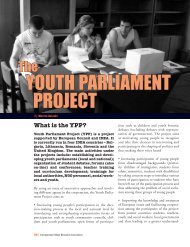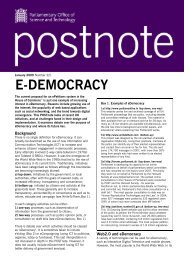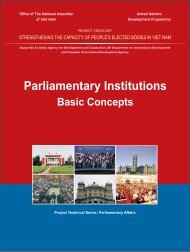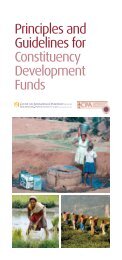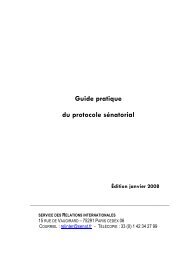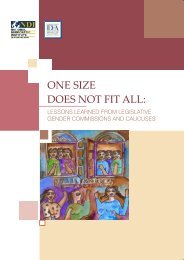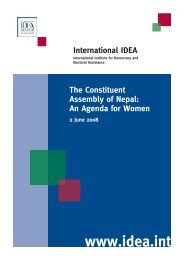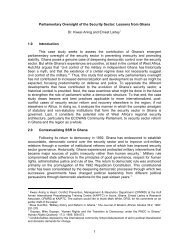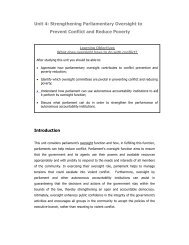Corruption and Development - pogar
Corruption and Development - pogar
Corruption and Development - pogar
You also want an ePaper? Increase the reach of your titles
YUMPU automatically turns print PDFs into web optimized ePapers that Google loves.
3.3.2. Anti-corruption as a cross-cutting<br />
development <strong>and</strong> governance issue<br />
While UNDP’s anti-corruption programming is<br />
under the democratic governance practice area, it<br />
recognizes corruption as a cross-cutting issue. Hence,<br />
fighting this phenomenon requires coordination <strong>and</strong><br />
collaboration among UNDP’s various practice areas,<br />
including democratic governance, poverty reduction,<br />
crisis prevention <strong>and</strong> recovery, <strong>and</strong> environment <strong>and</strong><br />
sustainable development (see Figure 6).<br />
3.3.3. Relevance of UNDP’s approach to<br />
other development processes<br />
UNDP’s experience show that the organization’s<br />
political impartiality, , global, regional <strong>and</strong> national<br />
partnerships <strong>and</strong> focus on governance have been<br />
its value-added contribution to the fight against<br />
corruption. UNDP also has a comparative advantage<br />
in anti-corruption work because it ensures national<br />
ownership through development frameworks such<br />
as CCAs, UNDAFs, PRSP, MDG reports <strong>and</strong> Technical<br />
Working Groups (TWGs).<br />
Figure 7: Key result areas in democratic governance, UNDP Strategic Plan 2008-11<br />
Dem<strong>and</strong> Side of DG/AC<br />
Inclusive Participation<br />
• Civil society<br />
• E-goverment<br />
• Electoral systems <strong>and</strong> processes<br />
• Political parties<br />
• Independent journalism<br />
Supply Side of DG/AC<br />
Responsive institutions<br />
• Parliaments<br />
• Justice<br />
• Public sector reform<br />
• Decentralized <strong>and</strong> local<br />
govenance<br />
• Economic governance<br />
International Principles<br />
•<br />
•<br />
•<br />
Gender<br />
Human rights<br />
Anti-corruption<br />
UNDP focuses on responsive <strong>and</strong> accountable<br />
institutions, on the one h<strong>and</strong>, <strong>and</strong> inclusive<br />
participation on the other, which cover the supply<br />
<strong>and</strong> dem<strong>and</strong> side of good governance, respectively.<br />
By mainstreaming anti-corruption into this picture,<br />
UNDP adds value to its approach, ensuring it has a<br />
more holistic <strong>and</strong> democratic view of governance.<br />
Figure 7 shows that, together with gender <strong>and</strong><br />
human rights, anti-corruption is mainstreamed<br />
into good governance as one of the ‘international<br />
principles’ for key results in UNDP Strategic Plan<br />
2008-2011. UNDP’s anti-corruption service area<br />
thus reinforces principles such accountability,<br />
transparency, integrity, rule of law, participation,<br />
responsiveness <strong>and</strong> equality within its key<br />
functional service areas of democratic governance.<br />
Similarly, UNDP’s presence in more than 160<br />
countries makes global knowledge <strong>and</strong> best<br />
practices readily available at the country level.<br />
Given these advantages, UNDP is in a unique<br />
position to engage a broad range of stakeholders<br />
to fight corruption <strong>and</strong> provide high quality<br />
support <strong>and</strong> advice on mainstreaming<br />
anti-corruption into broader public sector reform<br />
<strong>and</strong> development. As mentioned, it achieves the<br />
latter by integrating anti-corruption assessments<br />
into development frameworks <strong>and</strong> processes<br />
including national HD reports, PRSPs, MDG<br />
reports, CCAs <strong>and</strong> UNDAFs.<br />
29


